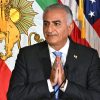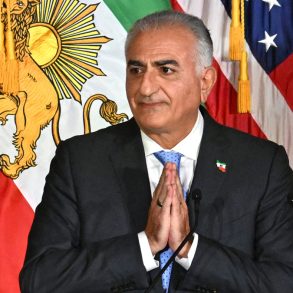President Donald Trump has announced that a new nuclear agreement between the United States and Iran is “fairly close.” Speaking to reporters in the Oval Office on Friday, he said, “I think we have a chance of making a deal with Iran. They don’t want to be blown up. They would rather make a deal, and I think that could happen in the not-too-distant future.”
Trump stressed that any potential agreement would be strong and would ensure that Iran’s nuclear program could be closely monitored. “I want the nuclear agreement very strong, where we can go in with inspectors, we can take whatever we want, we can blow up whatever we want, but nobody getting killed,” he explained. “We can blow up a lab, but nobody is gonna be in a lab, as opposed to everybody being in the lab and blowing it up.”
Decades of Dispute and Negotiations
The United States and Iran have been in conflict over Tehran’s nuclear program for decades. In 2015, Iran signed a landmark agreement with world powers, including the United States, which limited Iran’s uranium enrichment to 3.67 percent. In exchange, Iran received relief from international sanctions. However, in 2018, Trump withdrew the United States from this deal, calling it “weak” and saying it did not prevent Iran from developing nuclear weapons in the long term.
Since the United States left the 2015 deal, Iran has expanded its nuclear activities. According to the International Atomic Energy Agency (IAEA), Iran is now enriching uranium to 60 percent purity, far above the 3.67 percent limit but still below the 90 percent level needed to make a nuclear bomb. Iran insists its program is only for peaceful, civilian energy purposes.
The IAEA has expressed concern that Iran is the only country without nuclear weapons to enrich uranium at this level. The agency has also reported that Iran has failed to fully cooperate with a probe into secret nuclear work. In a recent report, IAEA Director General Rafael Grossi said, “The significantly increased production and accumulation of highly enriched uranium by Iran, the only non-nuclear-weapon State to produce such nuclear material, is of serious concern.”
Trump’s Reason for Optimism
Trump’s confidence that a deal is near comes from his belief that Iran does not want to risk war with the United States. “They don’t want to be blown up,” he repeated, referring to the possibility of U.S. military action. He added that he wants inspectors to have the power to check any part of Iran’s program to make sure it does not pose a threat.
Karoline Leavitt, White House press secretary, said on Saturday, “President Trump has made it clear that Iran can never obtain a nuclear bomb.” She added that Trump’s special envoy, Steve Witkoff, has already sent a detailed proposal to Iran. “It’s in their best interest to accept it,” she said.
Sources also told Reuters that Saudi Arabia is quietly urging Iran to take Trump’s offer seriously. In April, Saudi Arabia’s King Salman sent his son, Prince Khalid bin Salman, to Tehran to deliver a warning to Iran’s leaders. The message was that Trump’s patience is limited and that it would be wise to accept a deal before the chance disappears. Prince Khalid reportedly told Iranian officials, “The US leader has little patience for drawn-out negotiations.”
Critics Say Threats Won’t Work
Critics of Trump’s approach argue that his threats of violence against Iran are dangerous and could backfire. An unnamed Iranian official told the Fars news agency, “If the US seeks a diplomatic solution, it must abandon the language of threats and sanctions.” The official said that Trump’s statements are “open hostility against Iran’s national interests.”
Iranian leaders also reject claims that they are trying to build nuclear weapons. They say the program is for peaceful purposes only and have denied a report from Austrian intelligence that said Iran’s nuclear weapons program is “well advanced.” Iran’s foreign ministry called that report “fake information” and demanded an explanation from Austria’s government.
Israel’s Strong Response
Israel, which is widely believed to have its own nuclear weapons but has never confirmed it, is worried about any deal that might let Iran get closer to a bomb. Prime Minister Benjamin Netanyahu said, “The agency presents a stark picture that serves as a clear warning sign: despite countless warnings, Iran is totally determined to complete its nuclear weapons program.”
Netanyahu added that the international community “must act now” to stop Iran’s nuclear efforts. Israel has hinted in the past that it might strike Iran’s nuclear facilities if Tehran comes too close to building a bomb. Trump reportedly told Netanyahu that attacking Iran right now would not be appropriate.
Growing Tensions Over Uranium Stockpile
The IAEA has warned that Iran’s stockpile of 60 percent-enriched uranium has grown by around 50 percent since February. It now has enough highly enriched uranium to build about ten nuclear bombs if it chose to go that route. The agency said that Iran continues to produce this material at the rate of about one bomb’s worth each month. U.S. officials say Iran would need less than two weeks to turn this material into weapons-grade uranium.
Iran says that its nuclear activities are purely peaceful. The U.S. says it has no evidence that Iran has made a final decision to build a bomb, but that the country has made enough progress to assemble one quickly if it decided to.
Europe’s Concerns and Possible Sanctions
European countries involved in the 2015 deal are becoming increasingly frustrated. They have warned Iran that if it does not cooperate with the IAEA, they may push to bring back the international sanctions that were lifted under the deal. A senior European diplomat said that a resolution to declare Iran in noncompliance could be voted on at the IAEA board meeting on June 9.
If Iran is found to be in noncompliance, the United Nations could reimpose harsh sanctions later this year. Tehran has warned that it might withdraw from the Non-Proliferation Treaty altogether if that happens. In the past, when the IAEA or Western powers have criticized Iran, the country has responded by expanding its nuclear program even further.








